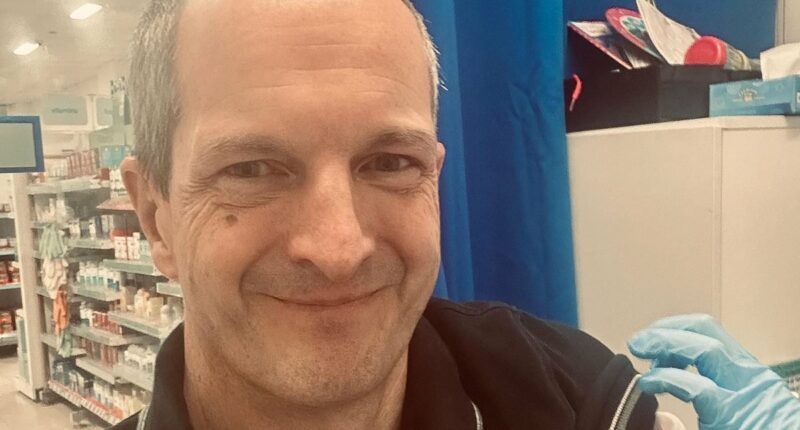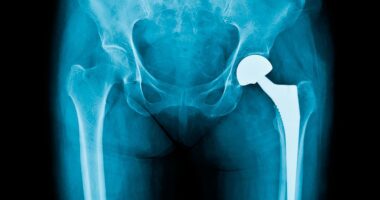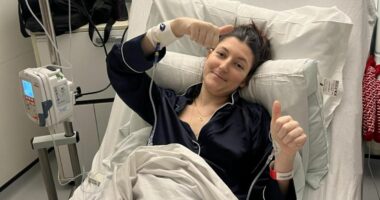Share this @internewscast.com
Last month, I returned to the Boots pharmacy in Notting Hill, conveniently located near my home, for my second dose of the shingles vaccine.
Admittedly, I wasn’t thrilled about the visit. Not only did it come with a hefty price tag of £230, but the initial shot I received six weeks prior had left me bedridden for an entire day due to a severe headache.
Despite this, skipping the second dose was never an option for me. My motivation to get vaccinated wasn’t driven by the usual reasons you might assume.
The vaccine, known as Shingrix, is provided by the NHS to protect older adults from shingles, a distressing illness triggered by the reactivation of the chickenpox virus from childhood. It’s a debilitating condition, but that wasn’t the primary reason I was willing to spend nearly £500.
There’s compelling evidence from observational studies indicating that shingles vaccinations might reduce the risk of developing dementia. The research suggests a potential decrease of up to 20 percent in risk over seven years, and as much as 50 percent for vascular dementia, a prevalent form of the disease.
During the Covid pandemic, I had the opportunity to serve as a government health minister. This role allowed me to witness firsthand the tremendous impact of public health strategies, particularly through the implementation of widespread vaccination programs.
I believe dementia now poses an even greater threat to our national health. More than 200,000 people in Britain are diagnosed each year and around 75,000 die from it – numbers that will only climb as the population ages.
Which begs the question: why isn’t the NHS making the shingles vaccine a cornerstone of its dementia-prevention strategy?

Lord Bethell was happy to pay for the vaccine to reduce his dementia risk
Like many people, this is a disease I’ve long worried about – shaped by seeing the cruelty of degenerative brain conditions up close.
My father, the politician Lord (Nicholas) Bethell, developed Parkinson’s disease at 56, younger than I am now. The condition is similar to dementia: it can impact movement and memory – and it robbed him of so much.
Yet he faced it with immense courage and little complaint. He died in 2007, aged 69, from a heart attack linked to the condition.
As a result, I’ve done everything I can to avoid a similar fate. The encouraging news is that many brain diseases are, at least in part, preventable.
Studies suggest that up to half of dementia cases could be avoided through lifestyle changes – several of which were highlighted earlier this month when The Mail on Sunday and Daily Mail launched their Defeating Dementia campaign with Alzheimer’s Society.
These include controlling blood pressure and cholesterol, exercising regularly, cutting back on smoking and excess alcohol, staying socially engaged and even using hearing aids or glasses when needed.
I take these measures seriously. To keep my blood pressure down, for example, I stay lean, run 25 to 30 miles a week and fast one day a week. In recent years, however, excitement around the shingles vaccine has been steadily growing.
In 2023, academics at Stanford University analysed health data from around 280,000 people in Wales and found that those who had received a shingles vaccine were significantly less likely to go on to be diagnosed with dementia.
The leading theory is that as we age, the dormant chickenpox virus, varicella-zoster, can also travel to the brain, where it may damage delicate neural tissue. Preventing that reactivation, the thinking goes, could help protect the brain.
Earlier this year, the drug giant GSK, which manufactures Shingrix, launched a ground-breaking study using data from up to 1.4 million NHS patients. Its aim is to investigate whether Shingrix can reduce the risk of dementia and, if so, by how much.
I should stress that I have no financial interest in GSK or any vaccine manufacturer.
If the findings are positive, the implications would be profound. Millions of older adults could benefit from protection offered by a vaccine that is already widely used by the NHS.
But, given the huge amount of data, there is no compelling reason for health officials not to start the process of expanding access. We already know the vaccine is safe, and we already know it is highly effective at preventing shingles.
Yet the NHS makes it maddeningly difficult to get it. People turning 65 or 70 can receive it, and it is offered up to the age of 80, but, confusingly, many in their late 60s fall into a gap and must wait. Anyone over 80 is not currently eligible.
At present, anyone who – like me – wants to take the initiative and lower their risk of dementia by getting the shingles vaccine, has to pay for it privately.
Yet if the jab were offered on a mass-scale on the NHS, it would cost no more than £200 per course, making it hugely cost-effective when set against the staggering financial and human costs of dementia care.
Lowering the age of eligibility to somewhere between 50 and 60 could potentially prevent tens of thousands of dementia cases.
That is why I am taking action. Earlier this month I wrote to officials at the Joint Committee on Vaccination and Immunisation – the body that decides which conditions the NHS vaccinates against – to ask what progress is being made towards approving vaccines like Shingrix as a dementia-prevention tool.
There is no time to waste. Within a decade, there will be 1.4million people living with dementia in the UK – making it the single biggest health challenge of our generation.
The shingles vaccine could prove a genuine breakthrough, helping more of us to enjoy longer lives in good health.
Dr Richard Oakley, Alzheimer’s Society’s Associate Director of Research and Innovation, said: ‘While several studies have shown a connection, currently we do not have the evidence needed to show for sure that the shingles vaccine prevents dementia.
‘More research is needed to understand the link.
‘There are steps people can take today to reduce their risk of dementia, such as exercising, not smoking and managing long-term health conditions like blood pressure and diabetes.
‘We know a holistic approach to good health is the best way to lower your risk of dementia.’












